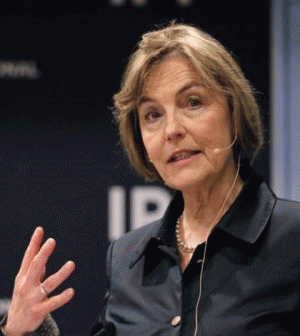- Finding Unshakable Power in a World That Wants to Pull Us ApartPosted 5 months ago
- What could a Donald Trump presidency mean for abortion rights?Posted 5 months ago
- Financial Empowerment: The Game-Changer for Women in Relationships and BeyondPosted 6 months ago
- Mental Health and Wellbeing Tips During and After PregnancyPosted 6 months ago
- Fall Renewal: Step outside your Comfort Zone & Experience Vibrant ChangePosted 6 months ago
- Women Entrepreneurs Need Support SystemsPosted 7 months ago
Croatian hoping to lead UN says she is "not a gender-neutral candidate"

Former Croatian Foreign Minister and U.N. Secretary-General candidate Vesna Pusic speaks at the International Peace Institute in the Manhattan borough of New York April 6, 2016. REUTERS/Lucas Jackson
By Sebastien Malo from trust.org
NEW YORK, April 6 (Thomson Reuters Foundation) – Croatian politician Vesna Pusic, hoping to become the next Secretary-General of the United Nations, says being a woman plays a key role in her election bid by shining a light on her career of gender equality activism.
The former foreign minister of Croatia is one of a quartet of female candidates vying to become the first woman to hold the U.N.’s top office.
“I am not a gender-neutral candidate,” Pusic said on Wednesday at an appearance at the International Peace Institute.
“It’s not about you, personally. It’s about changing the way institutions function and societies think,” she said.
Another contender, Helen Clark, New Zealand’s former prime minister, played down the gender aspect when she announced her candidacy this week, saying she has “never sought election as a woman.”
U.N. Secretary-General Ban Ki-moon’s term finishes at the end of 2016. The members of the U.N. General Assembly vote on a new leader later this year.
Kicking off the race late last year, the presidents of the U.N. Security Council and the General Assembly told member states in a letter that they were “encouraged to consider presenting a woman.”
Pusic stressed her activism on gender equality and her support for quotas to place women in political institutions.
But asked how she would increase female representation in the upper echelons of the UN, she did not mention quotas but said: “I would look for the best.”
As Croatia’s foreign minister, she opted for a results-oriented team rather than “specifically” seeking gender balance, she said.
Eight candidates so far are campaigning to succeed Ban.
Along with Pusic and Clark, they are Irina Bokova of Bulgaria, head of the U.N. Educational, Scientific and Cultural Organization (UNESCO), and Natalia Gherman, Moldova’s former foreign minister.
The men are former Slovenian President Danilo Turk; former U.N. High Commissioner for Refugees Antonio Guterres, who is also a former Portuguese prime minister; former Macedonian Foreign Minister Srgjan Kerim and Montenegro Foreign Minister Igor Luksic.
The candidates’ homeland also is likely play a role. The U.N.’s top job traditionally rotates among regions, with Eastern Europe next on the list.
Pusic expressed support for increased scrutiny of U.N. peacekeepers following a spate of allegations of sexual abuse.
She said military organizations that have committed crimes of sexual violence at home should not be deployed as peacekeepers abroad.
Next week, U.N. member states are scheduled to grill each candidate in a series of informal public meetings.
(Reporting by Sebastien Malo, Editing by Ellen Wulfhorst. Please credit the Thomson Reuters Foundation, the charitable arm of Thomson Reuters, that covers humanitarian news, women’s rights, trafficking, property rights and climate change. Visit http://news.trust.org)






